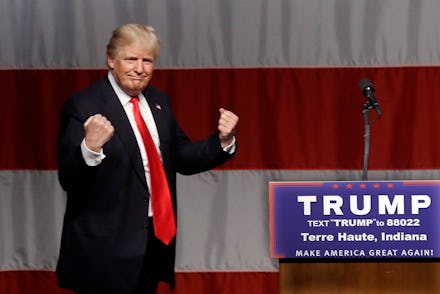Donald Trump Is Now the Presumptive Republican Nominee for President

It's happening.
Donald Trump — a brash billionaire who has never before run for elected office — effectively wrapped up the Republican presidential nomination on Tuesday night, dispatching chief rival Ted Cruz in the pivotal Indiana primary and prompting the Texas senator to withdraw from the race.
It's an outcome few could have foreseen 11 months ago, when Trump descended an escalator at his eponymous tower to launch his bid, delivering a speech slamming "rapists" pouring across the United States-Mexico border and promising to be "the greatest jobs president that God ever created."
Few took the former Celebrity Apprentice host seriously, unable to fathom how he could overcome the financial juggernaut of Jeb Bush, the youthful charisma of Marco Rubio, the conservative gravitas of Scott Walker or the Tea Party fan base of Cruz.
But with scorched-earth attacks on his opponents and a base of supporters drawn to his forceful anti-establishment message, Trump took down each of his primary rivals, capitalizing on GOP voters' hunger for a candidate with an unapologetic, swashbuckling attitude, particularly in light of the establishment GOP's failure to block key initiatives of the Obama administration, from the Affordable Care Act to executive actions on immigration reform. Conservative purity, it turned out, was a tertiary concern.
Now, only John Kasich remains in the race. But with only 153 delegates to Trump's 1,041, he cannot thwart Trump's path to the 1,237 delegates required to win the nomination.
In a statement on Tuesday night, Republican National Committee chairman Reince Priebus acknowledged Trump as the party's presumptive nominee:
Trump's focus will now shift to likely Democratic nominee Hillary Clinton, whom he has branded as "Crooked Hillary." Tearing down the former secretary of state won't prove an easy task. Though her advantage has narrowed in recent surveys, she boasts a 47% to 41% lead over Trump in the RealClearPolitics polling average, and Clinton hopes to capitalize on Trump's unpopularity with crucial demographics, including women and Latino voters. Trump may also suffer from a divided GOP; in ending his bid on Tuesday, Cruz pointedly did not endorse Trump.
Given that few serious observers expected Trump to reach this juncture, however, prognostications of a Clinton rout should come with a major asterisk. The Democratic standard-bearer is set to be tested by a candidate the likes of whom she has never before faced — and the country is in for a general election at once thrilling and profoundly uncertain.